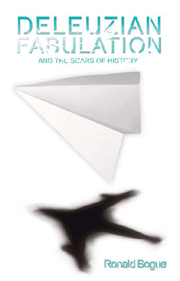Book contents
- Frontmatter
- Contents
- Acknowledgements
- Introduction
- 1 The Concept of Fabulation
- 2 Becoming-Prophet: Zakes Mda's The Heart of Redness
- 3 Becoming-Child, Becoming-Untouchable: Arundhati Roy's The God of Small Things
- 4 Becoming-Memory: Roberto Bolaño's Amulet
- 5 Becoming-Woman, Becoming-Girl: Assia Djebar's So Vast the Prison
- 6 Becoming-Fish: Richard Flanagan's Gould's Book of Fish
- Conclusion
- Bibliography
- Index
- Miscellaneous Endmatter
Conclusion
Published online by Cambridge University Press: 12 September 2012
- Frontmatter
- Contents
- Acknowledgements
- Introduction
- 1 The Concept of Fabulation
- 2 Becoming-Prophet: Zakes Mda's The Heart of Redness
- 3 Becoming-Child, Becoming-Untouchable: Arundhati Roy's The God of Small Things
- 4 Becoming-Memory: Roberto Bolaño's Amulet
- 5 Becoming-Woman, Becoming-Girl: Assia Djebar's So Vast the Prison
- 6 Becoming-Fish: Richard Flanagan's Gould's Book of Fish
- Conclusion
- Bibliography
- Index
- Miscellaneous Endmatter
Summary
What does it mean to be a writer today? For Djebar, to write is to run, to flee, to open a way forward; for Flanagan, to experiment and prophesy; for Bolaño, to battle forgetfulness, to preserve memory in the face of obliterating power; for Mda, to transform the scars of memory into a usable past; and for Roy, to revive traumatic memory but to find within it and preserve moments of possibility, when lovers may say ‘Tomorrow’. Djebar remarks that ‘perhaps the role of the writer is simply sometimes to witness to wounds’ (Gauvin 1997: 32), and all these writers have witnessed to wounds, some healed, some not. They are the wounds and scars of history inscribed on the bodies of those who continue to live and suffer it.
When Deleuze suggests that we abandon the concept of utopia and ‘take up Bergson's notion of fabulation and give it a political meaning’ (Deleuze 1995: 174), he does so in the name of a people to come, whose precise nature cannot be specified in advance. For Deleuze, then, to write is not to propose models of an ideal world but to hint at possibilities, to open a way forward through an experimentation on the real, an unsettling of the powers that be – their institutions, practices, categories and concepts – a process of becoming-other that engages the generative forces of metamorphosis immanent within the world.
- Type
- Chapter
- Information
- Deleuzian Fabulation and the Scars of History , pp. 223 - 236Publisher: Edinburgh University PressPrint publication year: 2010



